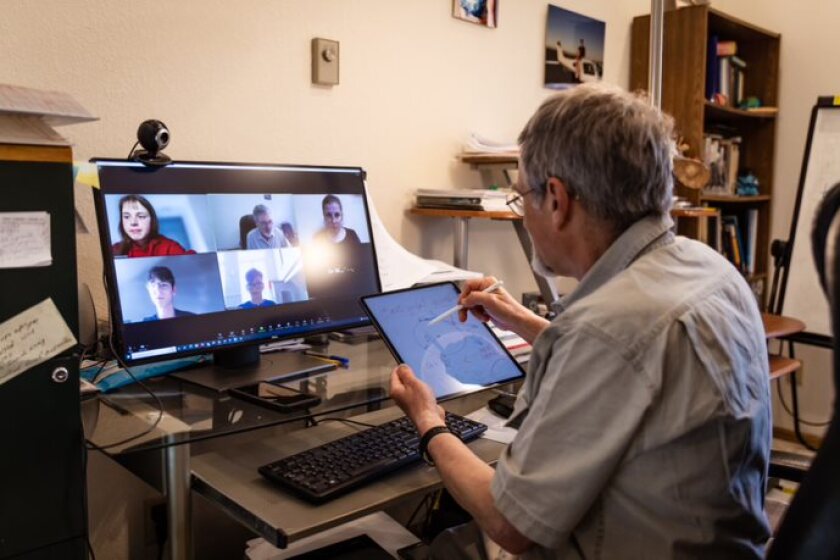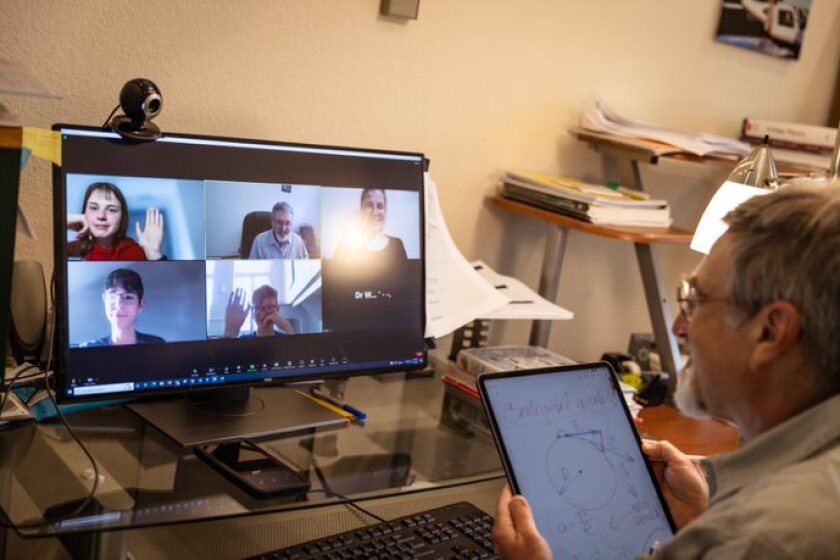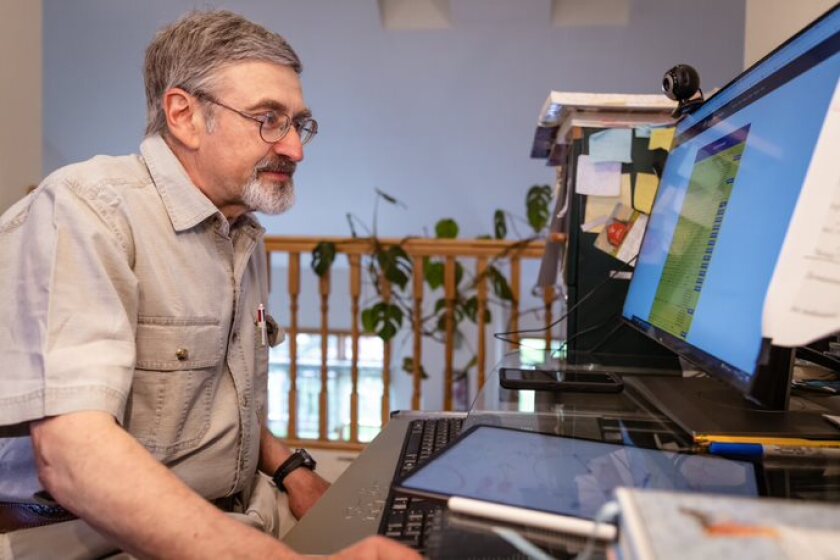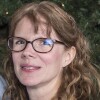SUPERIOR — Twice a week, Sergei Katsev holds a tutoring session.
His three students tune in from their computers on the other side of the world — two in Ukraine, one in Belgium. All three have been displaced by the Russian invasion of Ukraine. One student is sent assignments — a pile of problems every week — with only the textbook for a guide. Another wants to make sure she’s getting everything. The third is seeking advanced work to challenge himself.
Learning has been interrupted for these 10th graders; Katsev, a professor of physics at the University of Minnesota Duluth, is bridging the gap through Tutoring Without Borders, a program that pairs volunteer tutors with displaced Ukrainian students around the world. The work has changed his perspective.
“Doing your part here — just helping somebody — suddenly brings that meaning to what you do, because ... you feel this is really important. It’s making a real difference in the lives of people,” said Katsev, who is from Belarus.
'What can I do?'
The program was started by Michael Waxman, a chemistry professor at the University of Wisconsin-Superior.
ADVERTISEMENT
“When the war started I felt totally helpless,” said Waxman, who is from Siberia but has no direct ties to Ukraine. "I started to donate some money to some causes of humanitarian help to Ukraine. But you know, UWS professors are not exactly the richest people on earth. So then I felt, what can I do?”
With his wife Sofia’s encouragement, Waxman placed a post on Facebook offering free tutoring in math, physics and chemistry for displaced Ukrainian students. Requests started to come in.
The UWS professor realized the impact his tutoring had when the mother of one of his students, a professional psychologist, contacted him in early April. Their family was from Kyiv and was hiding in a small town in Ukraine.
After the war started, he became depressed and was shaking from every sound. Both his parents tried to talk with him, but it hadn’t helped.

“And then she told me, ‘When you started to tutor him, he immediately turned into his old, pre-war self. Started to spend time on YouTube, searching those physics videos and everything, just totally my pre-war child,’” Waxman said.
He turned to his colleague Vitaly Vanchurin, a former physics professor from UMD, for help to expand the program. Their sons, recent graduate Sasha Waxman and high school students Kosmos Vanchurin and Daniel Gorbatov, developed a website. Waxman posted ads on sites seeking tutors and students.
Making the match
Tutoring Without Borders is, in essence, a free academic version of a dating app. Once paired with students, tutors independently work out times and decide on their learning strategy. There is no cost to either students or tutors.
As of Friday, June 24, the initiative had 1,005 students seeking tutors and a little over 500 tutors available. The requests, and the help, come from countries around the world — Germany, the Netherlands, Israel, Canada, Spain, Singapore and more.
ADVERTISEMENT
The program is available to all Ukrainian students, from first graders to those at the end of their university career. Tutors in all subjects, particularly the Ukrainian launguage, are being sought.
"The need is huge," Waxman said.
Every morning at 5 a.m., the UWS professor sits down at his computer to match students with tutors. He said being able to connect a student from Mariupal, “a city that is no longer,” to a tutor brings him immense satisfaction.
“It brings me goosebumps to my back every time I do it,” he said.
Ten hours a week, Waxman tutors students in math, chemistry and physics with an iPad and a computer screen. Although he tends to teach college-level chemistry, Waxman said his youngest students have been some of his most interesting.
“Since they are only 10 and 11, I surmised it would be cruel to spend an entire hour just solely solving math problems, so I make it interesting with reading ‘Winnie the Pooh’ in English and in Russian and comparing the translation to the original,” Waxman said.
He knows they appreciate the connection.
“One kid messaged me on Facebook ... ‘Dr. Waxman there’s still an hour to wait until your class. I just don’t know how I can wait for another hour.' That was very touching because I’m teaching at the university level for 30 years and no student has ever messaged anything like that,” Waxman said.
ADVERTISEMENT
The Ukrainian school year has ended, but Katsev continues to meet twice a week with his students. They discuss different topics in physics that interest them. One student asked for information on how radio jamming worked.
“It’s some routine and it’s also talking to somebody who is outside of their normal circle. I think that gives them some sort of normalcy, it’s also some sort of connectedness to the world,” Katsev said.

Tutors needed
People who speak Ukrainian can tutor students even if they don’t have a teaching degree. A number of students are seeking help learning languages, ranging from English and German to Dutch. There is even a need for tutors in specialties like music theory.
While being able to speak Ukrainian or Russian is needed for some subjects, tutors can also be matched with students who have higher levels of proficiency in English.
Julie Gard, a writing professor at UWS, is tutoring an eighth grade student from Kyiv in conversational English. Gard does not speak Ukrainian, but she learned Russian when she lived there for two years in her 20s. Her student's English is strong enough that Gard said they primarily communicate in English.
For Katsev, becoming a tutor was a relief.
“When the war started, the first month or more were this agonizing frenzy of checking the news, checking what’s going on — feeling this constant need to do something, right?” Katsev said. “ ... So for me ... starting to do that was a relief when you can get off the news and actually do something.”
ADVERTISEMENT
Anyone interested in becoming a tutor can sign up on the Tutoring Without Borders website . More information is also available on the Tutoring Without Borders Facebook page.












